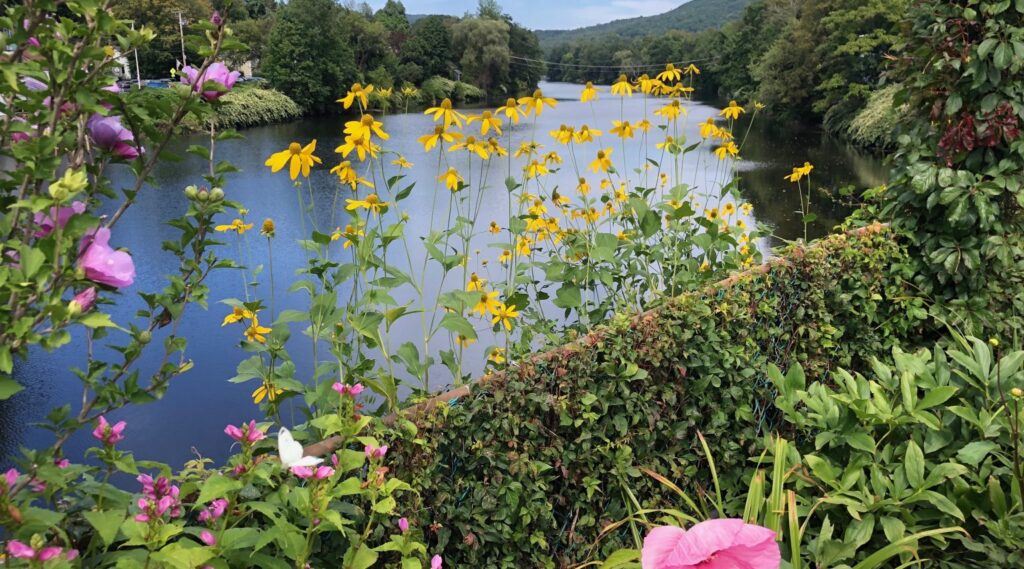Opinion: Climate News from Four Continents

Looking upstream from the Bridge of Flowers in Shelburne Falls, Massachusetts — a 100+ year-old trolley bridge converted to a footpath with magnificent gardens its entire length. Photo: Russ Vernon-Jones.
Love, Justice and Climate Change

There have been so many interesting items in the climate news recently that I decided to use this post to share a few of them with you. Some have cheered me; some have infuriated me; others leave me feeling deeply sad. Here are ones that I found especially interesting.
G20 Government Subsidies to Fossil Fuels = $1 trillion
Twenty of the world’s largest economies (the G20 nations) combined to provide government subsidies for fossil fuels of more than $1 trillion in 2022. This is the largest amount ever. This analysis came from the International Institute for Sustainable Development. The Institute said that “This support perpetuates the world’s reliance on fossil fuels …. It also severely limits the possibilities of achieving climate objectives set by the Paris Agreement by incentivizing greenhouse gas (GHG) emissions while undermining the cost-competitiveness of clean energy.”
Much of the increase in subsidies came from efforts to reduce the price of fuels for consumers as fossil fuel prices rose dramatically. Supporting consumers is understandable and desirable, but there are much better ways to do it than subsidizing the fuels. Giving financial support to people while letting fossil fuel prices rise would stimulate greater adoption of renewable energy.
The Institute report called on the G20 nations to set a firm deadline for completely eliminating all fossil fuel subsidies. While some brief transition period may be needed, it seems to me to be a matter of simple common sense–if you want people to stop using something (and we do need everyone to stop using fossil fuels) then you stop using government money to make it cheaper.
Huge Protests in the Netherlands
The Netherlands is often seen as a pro-renewable-energy country with good climate policies, but a separate report came out in September revealing the government there spends tens of billions of euros per year subsidizing industries that use coal, oil and gas. This led to a response from the people unlike anything we’ve seen in the U.S. yet: over 10,000 people blocked a major highway in protest and vowed to continue protesting until the subsidies were removed. The police detained 2,400 demonstrators. I’m convinced that we will need to see many more such demonstrations in all the wealthy nations before we get the governmental policies we need to stop the climate crisis. Market forces and government officials are not going to do nearly enough on their own.
Ecuador Votes to Ban Some Oil Drilling
In Ecuador indigenous activists, young people, and other climate supporters have been organizing, advocating, and petitioning for years to get a referendum to ban oil drilling in a national park in the Amazon, an area of unique biodiversity and an indigenous homeland. When the vote finally came in late August, the population voted overwhelmingly to ban drilling there. This is thought to be the first time that a nation has voted to leave oil in the ground. There will still be drilling in other areas in Ecuador, but it is still a remarkable victory and a sign of what’s possible.
Deadly Floods in Libya
I’m deeply saddened by the news of catastrophic flooding in Libya, the North African country between Egypt and Algeria. In mid-September Storm Daniel, a strong Mediterranean cyclone, brought torrential rains and high winds. Two large dams upstream from a major city burst and flooded the city and beyond. Over 4,000 people were killed and weeks later there were still more than 8,000 missing. The warmer oceans caused by climate change led to more moisture being in the air, resulting in more intense rainfall. The flood waters swept away homes, roads, bridges, and other structures, and impacted health services and food supplies.
New Climate Action in California
In California, the legislature has passed, and the Governor has announced that he will sign a new bill requiring large companies that do business in California (which is most of the biggest companies) to publicly disclose their carbon footprints. This will include information about emissions in their supply chains and by their end-users. This could be a game-changing step for the entire country.
The state of California has also just sued several of the world’s biggest oil companies, claiming their actions have caused tens of billions of dollars in damage and that they deceived the public by downplaying the risks posed by fossil fuels. This has been called the “most significant” legal action against the fossil fuel industry in U.S. history. (Note: California has the fourth largest economy in the world after the U.S., China, and Japan.)
Keeping Love at the Center
It seems to me that caring about climate change and its effects on people, other living things, and the earth, means that we get to feel a wide range of emotions. We grieve losses, feel some righteous rage at those who make things worse, sometimes feel overwhelmed, are inspired by the people to act for a better world, enjoy connecting with those who share our passion for justice, and more. This is often not an easy path, but I think feeling all these emotions is healthy, and it is certainly part of being human. Perhaps caring is not for the faint-hearted, but I think our best chance of living good lives in the midst of the climate crisis is to keep love at the center.
Russ Vernon-Jones was principal of Fort River School 1990-2008 and is currently a member of the Steering Committee of Climate Action Now-Western Massachusetts. He blogs regularly on climate justice at www.russvernonjones.org.
____________________________
Photo above:
